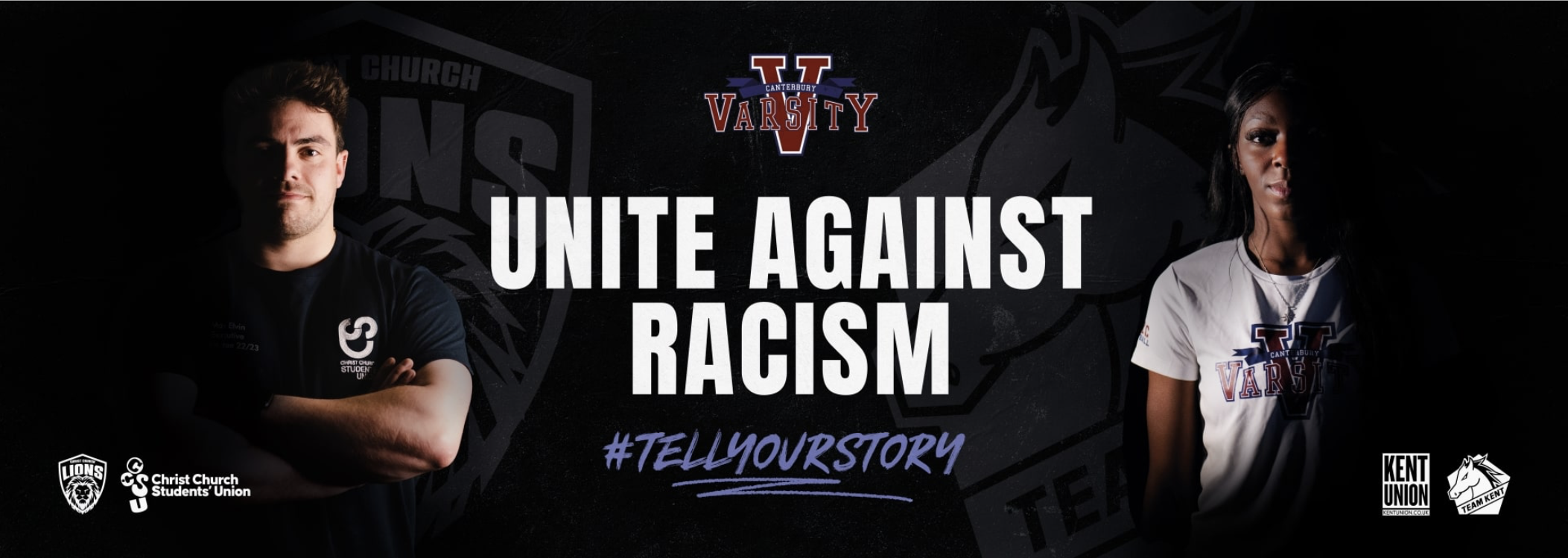As sports teams from the University of Kent and Canterbury Christ Church University prepared to go head-to-head in this year’s Varsity competition, there was more at stake than just who would claim the title of champion.
As boot laces were tightened, warmups ran and equipment double-checked, students were coming together in solidarity not just for the love of the game, but also to take a stand – against racism, prejudice, and discrimination.
Students were coming together in solidarity not just for the love of the game, but also to take a stand against racism, prejudice, and discrimination.
Those participating in Varsity events pledged to take the knee at the start of each game to highlight the ongoing struggle for racial equality in sport – and to underscore the need to increase equality and inclusion, emphasising that racism persists, despite progress.
But this year, the two universities and their SUs were using the competition to kick off a bigger campaign to help tackle racism in sport – and beyond the pitch.
Making student voices heard
The “Tell your story” campaign is designed to tackle low representation in sport and wider societies and create a more inclusive community by sharing stories, experiences, and amplifying the voices of marginalised individuals.
It launched on the International Day for the Elimination of Racial Discrimination, and the day before the start of Varsity.
It centres around a 2-part film series which sees 8 student athletes from racially and ethnically marginalised (REM) backgrounds share their stories, speaking about how their experiences have been shaped by racial discrimination and prejudice in sport.
As Anna, a student athlete, shared:
“Taking a knee before the game isn’t just a gesture. It’s a statement that we’re all in this together, fighting for equality on and off the field.
Our previous data suggests that racially and ethnically marginalised (REM) students are underrepresented in our sports clubs by 12%.
Sport England’s work inspired this present campaign as it has the ambition to increase participation levels and close the race gap – similar to the effort we have seen around the gender pay gap and the attainment gap, but on a wider scale.
It notes that:
“…participation in sport and physical activity for specific Black, Asian and minority ethnic groups is below national participation levels.
It is clear to both of us that there was a lack of participation and representation amongst our REM students in our sports clubs and committees – something which couldn’t be ignored.
Varsity tends to be seen solely as a competitive event; however, we’re hoping that by being the first SUs to include the Tell Your Story campaign, we’re leading the way for other institutions to follow and create a wave of inclusive engagement and meaningful change.
In line with our values at Kent Union, this campaign is bold, supportive, and inclusive. It will also support the wider work being done at universities to tackle racism and create an inclusive environment for all.
We are committed to actively amplifying the voices of marginalised individuals within our community, striving to cultivate an environment where discussions on race are not avoided but welcomed by all – to encourage allyship and highlight that discrimination has no place on our campuses.
Toni Abiodun
VP Student Engagement (Kent Students’ Union)
Taking it off the pitch
As our university and cultural demographics continually evolve, it’s imperative that we stay attuned to these changes to ensure that everyone’s voices are not only heard but also represented.
By amplifying the voices of REM students, we’re not just addressing issues of discrimination in sport, but also creating an environment where all students feel empowered, proud to be a part of, and able to participate in fully.
The Tell Your Story campaign represents an important milestone in this ongoing journey towards inclusivity and equality, but it is just the beginning.
This campaign is a testament to the commitment of students at both universities to drive positive change, and it sets a promising precedent for our continued efforts in this important area.
We hope that other universities and SUs will look to combine Varsity and campaigns that recognise marginalised groups like, the Tell Your Story campaign, in the future.
The conversation is not over, it is just beginning.

